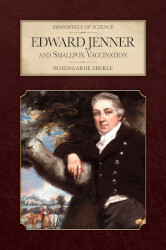Edward Jenner and Smallpox Vaccination

Author:
Irmengarde Eberle
Illustrator:
Henry S. Gillette
Publication:
1962 by Franklin Watts, Inc
Genre:
Biography, Non-fiction, Science
Series:
Immortals of Science ![]() Members Only (World History)
Members Only (World History)
Pages:
153
Current state:
This book has been evaluated and information added. It has not been read and content considerations may not be complete.
Book Guide
Search for this book used on:
EDWARD JENNER, a practicing physician, probably owed his discovery of vaccination as a preventive of smallpox to two circumstances in his own life: he was born and live in Gloucestershire, England, in dairying country, and had endured weeks in an old-time smallpox "inoculation stable" when he was a small child. He never forgot the horrible experience.
Intrigued by the old dairying superstition that victims of the cattle disease, cowpox, would never thereafter catch smallpox, he resolved to investigate this belief, with an eye to working out an immunization method against the dreaded human disease.
How for many years he doggedly persisted against prejudice, ill fortune, and ill will, and lived to see his hopes brilliantly fulfilled, makes a scientific story which is at the same time warm with human interest...
From the dust jacket
To view an example page please sign in.
Content Guide
Please sign in to access all of the topics associated with this book and view other books with the same topics.
Please sign in to access the locations this book takes place in and view other books in the same location.
Please sign in to access the time periods this book takes place in and view other books in the same time period.
For information about the lead characters please sign in.
Reviews

Immortals of Science Series
Reviewed by Sara Masarik
These books are of varying lengths based on how much is known about the lives of the subject. Whatever the length, I sped through each one as though it were a suspense novel. How will this one manage to carry on his work in the midst of civil war? How can that one earn the respect of the scientific community so his work can be published for the world? What will be the exciting sequence of events that will lead to the ultimate breakthrough? Will he live long enough to find the answer he has searched for all his life?
The science in these books is written in language any curious reader will be able to understand. The authors don’t condescend, but the writing is not above a confident reader, perhaps ten and above. They would also be interesting enough for reading aloud so they can be shared with the entire family, whatever their ages.
Find This Book
Search for this book used on:



